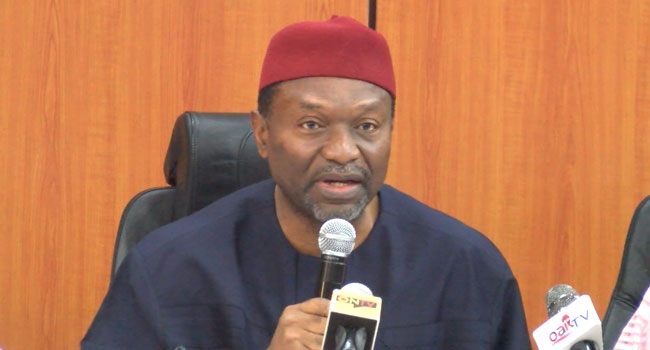 Senator Udoma Udo Udoma, Minister of Budget and National Planning[/caption]
Senator Udoma Udo Udoma, Minister of Budget and National Planning[/caption]
The Federal Executive Council (FEC) on Wednesday approved the 2017-2019 Medium Term Expenditure Framework (MTEF) and Fiscal Strategy Paper (SFP).
Senator Udoma Udo Udoma, the minister of Budget and national planning confirmed this approval to State House reporters after a four-hour FEC meeting presided over by President Muhammadu Buhari.
The Minister who was accompanied by Okechukwu Enelamah, the Minister of Industry, Trade and Investment, and the Special Adviser to the President on Media and Publicity, Mr. Femi Adesina, briefed the reporters on the highlights of the approved document to include oil price benchmark of $42.50 for 2017; $45 for 2018; and $50 for 2019.
Advertisement
Udoma said “Oil price benchmark, we intend to use $42.50 as a reference price in 2017. We are projecting $45 in 2018 and $50 in 2019. So we are keeping to the very conservative in terms of the reference price of crude oil even though we are expecting it to go higher than this but we are keeping to an extremely conservative price scenario.
“In terms of oil production, we are keeping to the same level of this year for 2017 and that is 2.2 million barrels per day. For 2018, 2.3 million barrels per day, for 2019 2.4 million barrels per day,” he stated.
On GDP growth, Udoma said, “In terms of growth rate, we are targeting in 2017 a three per cent growth rate, 2018 a 4.26 per cent growth rate and 2019 a 4.04 per cent.
“The reason 2019 is slightly lower than 2018 is because that is an election year and usually in an election year there are uncertainties; we have also made provision for that.”
Advertisement
He said in terms of the currency, the government put it at N290 to $1 exchange rate.
Udoma expressed the hope that the naira would stabilise, adding that N290 to $1 is a fair estimate from the Central Bank of what the naira is worth.
The minister further stated that with the approval of the MTEF, which will be sent to the National Assembly for consideration by lawmakers, the government had started the process of preparing the 2017 budget.
“The FEC meeting approved the Medium Term Expenditure Framework (MTEF) and Fiscal Strategy Paper (SFP) for 2017 to 2019.
“As you know, the Fiscal Responsibility Act requires the executive to prepare the MTEF and send it to the National Assembly for their consideration. And it is on the basis of the MTEF that the next budget will be fashioned. So in short, we started the process of preparing the 2017 budget,” he said.
Advertisement
Udoma added that before the MTEF was presented to FEC for consideration, there was an extensive consultation with the private sector, governors and NGOs.
According to him, in the 2017-2019 MTEF, the government intends to intensify efforts in pursuing a manpower-driven economy.
“So, we intend to intensify the efforts to diversify the economy. We intend to go on with the implementation of ongoing reforms in public finance. We intend to enhance the environment for ease of doing business so as to generate private sector investment.
“We intend to continue to pursue gender sensitive, pro-poor and inclusive social intervention schemes similar to what we did in 2016; our social intervention programmes is going to be sustained.
“We intend to devote even more resources to critical infrastructure projects just as we did this year. So we will continue to spend more on roads, rails, transport infrastructure, ports and so on. We intend to focus on governance and security and we intend to maintain the zero-based budgetary approach.
“We intend to focus on plane governance and security and we intend to maintain the zero-based budgetary approach,” Udoma said.
Advertisement
Enelamah, who also disclosed that the Council approved the ratification of the World Trade Organisation (WTO) Trade facilitation agreement.
He explained that the agreement was approved by all the members of WTO in the ministerial conference that was held in 2013 and that the agreement basically, seeks to lower the cost of trade generally for everybody.
“There was a clear understanding that everybody benefits from lowering the cost of doing trade, it is particularly beneficial to developing countries that want to be able to access the international market.
“Nigeria was one of the countries that approved the agreement then and we have been going through the process to ratify the agreement so that it will come into effect,” the trade and investment minister added.


